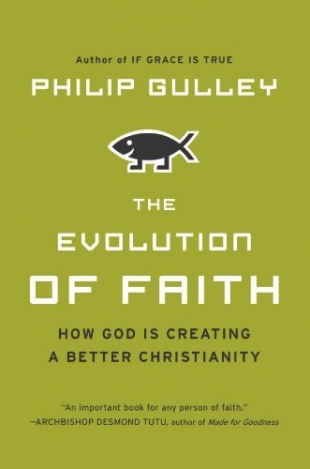Philip Gulley is a Quaker minister, writer, husband, and father. He is the author of 15 books including If the Church Were Christian. He is a frequent speaker at churches, colleges, and retreats across the country. Visit the author online at www.philipgulleybooks.com and www.philipgulley.org. In this ambitious work, Gulley addresses those who are seeking "transcendent meaning, spiritual community, and joy" in a faith that is "informed by common-sense, human experience, and the more enlightened aspects of religious tradition." What this requires is an evolution of Christian faith.
What factors are contributing to the need for a new stage of Christianity? Gulley sees four: (1) religious diversity, (2) expanded communication, (3) advancements in science, and (4) the church's diminishing role as the sole religious authority. He goes on to discuss the violence inflicted upon those who do not agree with Christian interpretations of revelations about God. The best approach to this knotty subject is to say that the start of revelation is compassion for the least of God's children, and also to accept that our moments of divine visitation can never be planned.
Throughout the rest of the book Gulley examines other developments in the continuing evolution of Christianity. He believes that God is honored by a spirit of exploration rather than an adherence to dogma. The Holy One is best understood as "that universal and inward impulse that inspires us to seek the best for others." We can be like Jesus and other "God-Bearers" by serving others and putting them first. And finally, it would be well for us to honor the free range of Spirit as a compass in our lives.
Gulley tackles the church's longstanding tradition of putting the accent on human sin and failure rather than on "a new story of human worth, dignity, and potential." He laments that the toxic negativism and pessimism of fundamentalist Christians have driven many out of churches. Gulley salutes optimism as a spiritual virtue and prayer as attention to that which matters. He wants churches to be centers for reconciliation and for believers to concentrate on the present rather get all worked up about heaven and hell. One of his key points, which as a multifaith website we heartily endorse, is this one:
"The future of Christianity will rest in our ability to make our spiritual boundaries more porous, welcome the wisdom of other faiths, and borrow the best from other spiritual traditions, even as we share with them the stories and insights of Christianity. This in no way dishonors the contributions of Jesus, but recalls his appreciation for those persons thought to be outside the circle of God's favor."
Let us rejoice and be exceedingly glad that God is creating a better Christianity!
